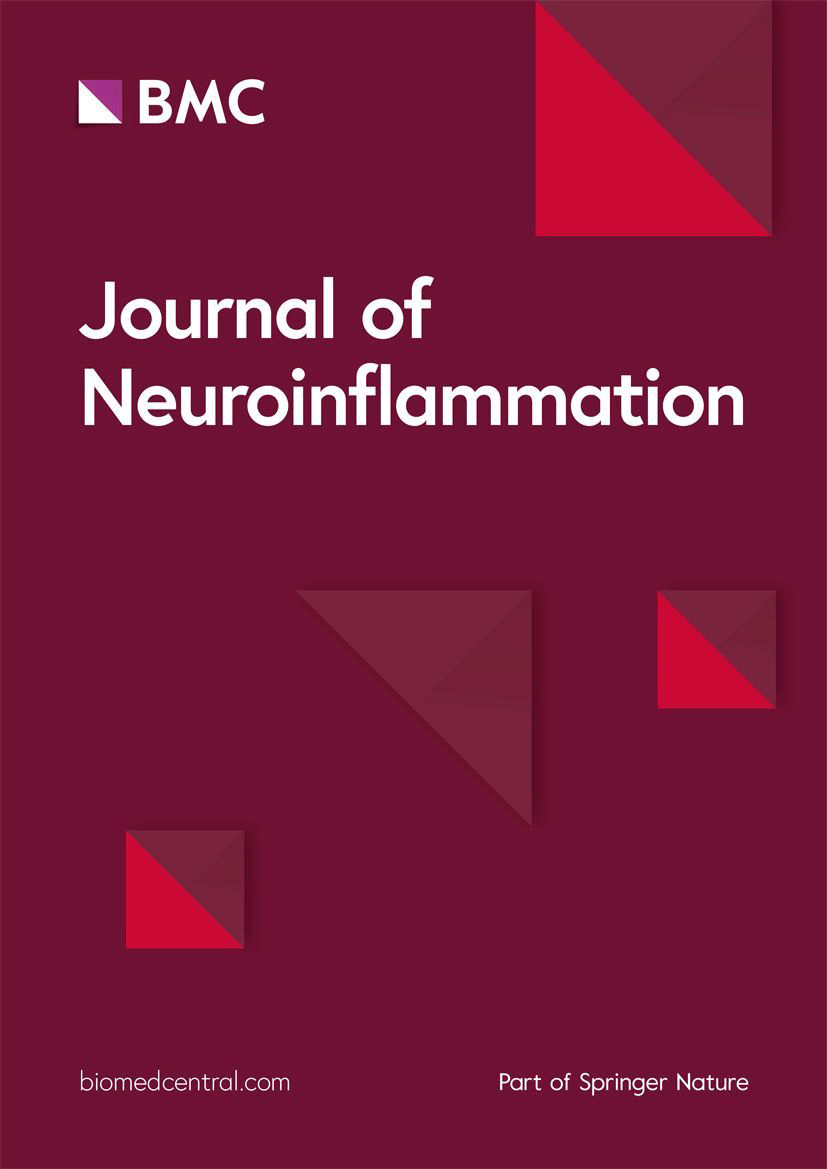PPARγ 激活可改善 r-mTBI 后的认知障碍和慢性小胶质细胞活化
IF 9.3
1区 医学
Q1 IMMUNOLOGY
引用次数: 0
摘要
慢性神经炎症和小胶质细胞活化是继发性轻度创伤性脑损伤(r-mTBI)后继发性损伤级联和认知障碍的关键介质。过氧化物酶体增殖激活受体-γ(PPARγ)在小胶质细胞和脑驻留髓系细胞类型上表达,其信号在调节小胶质细胞反应方面发挥着重要的抗炎作用。在损伤后的慢性时间点,组成型 PPARγ 信号被认为是失调的,从而解除了对慢性激活的小胶质细胞的抑制作用。越来越多的证据表明,噻唑烷二酮类化合物(TZDs)是一类被批准用于治疗糖尿病的化合物,它能通过激活过氧化物酶体增殖激活受体-γ(PPARγ)有效减轻神经炎症和慢性小胶质细胞活化。本研究采用闭合头颅 r-mTBI 模型,研究 TZD 吡格列酮对 r-mTBI 暴露后认知功能和神经炎症的影响。我们发现,吡格列酮治疗可减轻伤后6个月的空间学习和记忆损伤,并减少皮质、海马和胼胝体中反应性小胶质细胞和星形胶质细胞标记物的表达。我们随后研究了吡格列酮治疗是否会改变离体小胶质细胞的炎症信号转导机制,并证实了促炎症转录因子和细胞因子水平的下调。为了进一步研究PPARγ介导的神经保护的小胶质细胞特异性机制,我们产生了一种新型他莫昔芬诱导的小胶质细胞特异性PPARγ过表达小鼠品系,并研究了它对损伤后小胶质细胞表型的影响。通过 RNA 测序,我们发现 PPARγ 的过表达能改善小胶质细胞的活化,促进与伤口愈合和组织修复相关的通路(如 IL10、IL4 和 NGF 通路)的活化,并抑制疾病相关的小胶质细胞样(DAM-like)表型的形成。这项研究深入揭示了 PPARγ 作为小鼠 r-mTBI 后神经炎症级联的关键调节因子的作用,并证明使用 PPARγ 激动剂(如吡格列酮和新一代 TZDs)对预防 r-mTBI 的慢性神经退行性后遗症具有强大的治疗潜力。本文章由计算机程序翻译,如有差异,请以英文原文为准。
PPARγ activation ameliorates cognitive impairment and chronic microglial activation in the aftermath of r-mTBI
Chronic neuroinflammation and microglial activation are key mediators of the secondary injury cascades and cognitive impairment that follow exposure to repetitive mild traumatic brain injury (r-mTBI). Peroxisome proliferator-activated receptor-γ (PPARγ) is expressed on microglia and brain resident myeloid cell types and their signaling plays a major anti-inflammatory role in modulating microglial responses. At chronic timepoints following injury, constitutive PPARγ signaling is thought to be dysregulated, thus releasing the inhibitory brakes on chronically activated microglia. Increasing evidence suggests that thiazolidinediones (TZDs), a class of compounds approved from the treatment of diabetes mellitus, effectively reduce neuroinflammation and chronic microglial activation by activating the peroxisome proliferator-activated receptor-γ (PPARγ). The present study used a closed-head r-mTBI model to investigate the influence of the TZD Pioglitazone on cognitive function and neuroinflammation in the aftermath of r-mTBI exposure. We revealed that Pioglitazone treatment attenuated spatial learning and memory impairments at 6 months post-injury and reduced the expression of reactive microglia and astrocyte markers in the cortex, hippocampus, and corpus callosum. We then examined whether Pioglitazone treatment altered inflammatory signaling mechanisms in isolated microglia and confirmed downregulation of proinflammatory transcription factors and cytokine levels. To further investigate microglial-specific mechanisms underlying PPARγ-mediated neuroprotection, we generated a novel tamoxifen-inducible microglial-specific PPARγ overexpression mouse line and examined its influence on microglial phenotype following injury. Using RNA sequencing, we revealed that PPARγ overexpression ameliorates microglial activation, promotes the activation of pathways associated with wound healing and tissue repair (such as: IL10, IL4 and NGF pathways), and inhibits the adoption of a disease-associated microglia-like (DAM-like) phenotype. This study provides insight into the role of PPARγ as a critical regulator of the neuroinflammatory cascade that follows r-mTBI in mice and demonstrates that the use of PPARγ agonists such as Pioglitazone and newer generation TZDs hold strong therapeutic potential to prevent the chronic neurodegenerative sequelae of r-mTBI.
求助全文
通过发布文献求助,成功后即可免费获取论文全文。
去求助
来源期刊

Journal of Neuroinflammation
医学-神经科学
CiteScore
15.90
自引率
3.20%
发文量
276
审稿时长
1 months
期刊介绍:
The Journal of Neuroinflammation is a peer-reviewed, open access publication that emphasizes the interaction between the immune system, particularly the innate immune system, and the nervous system. It covers various aspects, including the involvement of CNS immune mediators like microglia and astrocytes, the cytokines and chemokines they produce, and the influence of peripheral neuro-immune interactions, T cells, monocytes, complement proteins, acute phase proteins, oxidative injury, and related molecular processes.
Neuroinflammation is a rapidly expanding field that has significantly enhanced our knowledge of chronic neurological diseases. It attracts researchers from diverse disciplines such as pathology, biochemistry, molecular biology, genetics, clinical medicine, and epidemiology. Substantial contributions to this field have been made through studies involving populations, patients, postmortem tissues, animal models, and in vitro systems.
The Journal of Neuroinflammation consolidates research that centers around common pathogenic processes. It serves as a platform for integrative reviews and commentaries in this field.
 求助内容:
求助内容: 应助结果提醒方式:
应助结果提醒方式:


